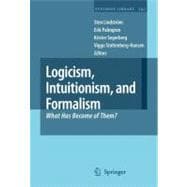
| Preface | |
| Notes on the Contributors | |
| Introduction | |
| Logicism and Neo-Logicism | |
| Protocol Sentences for Lite Logicism | |
| Frege's Context Principle and Reference to Natural Numbers | |
| The Measure of Scottish Neo-Logicism | |
| Natural Logicism via the Logic of Orderly Pairing | |
| Intuitionism and Constructive Mathematics | |
| A Constructive Version of the Lusin Separation Theorem | |
| Dini's Theorem in the Light of Reverse Mathematics | |
| Journey in Apartness Space | |
| Relativisation of Real Numbers to a Universe | |
| 100 years of Zermelo's Axiom of Choice: What Was the Problem With It? | |
| Intuitionism and the Anti-Justification of Bivalence | |
| From Intuitionistic to Point-Free Topology | |
| Program Extraction in Constructive Mathematics | |
| Brouwer's Approximate Fixed-Point Theorem is Equivalent to Brouwer's Fan Theorem | |
| Formalism"G+ del's Modernism: On Set-Theoretic Incompleteness,"Revisited | |
| Tarski's Practice and Philosophy: Between Formalism and Pragmatism | |
| The Constructive Hilbert-Program and the Limits of Martin-L+ f Type Theory | |
| Categories, Structures, and the Frege-Hilbert Controversy: the Status of Meta-Mathematics | |
| Hilbert and the Problem of Clarifying the Infinite | |
| Index | |
| Table of Contents provided by Publisher. All Rights Reserved. |
The New copy of this book will include any supplemental materials advertised. Please check the title of the book to determine if it should include any access cards, study guides, lab manuals, CDs, etc.
The Used, Rental and eBook copies of this book are not guaranteed to include any supplemental materials. Typically, only the book itself is included. This is true even if the title states it includes any access cards, study guides, lab manuals, CDs, etc.